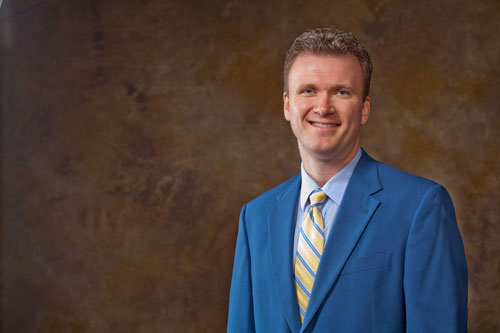John Pijanowski started out teaching ethics to graduate students who are studying to become school administrators. Now, he is also teaching ethics to undergraduate and graduate students who will become scientists.
Pijanowski is an associate professor of educational leadership at the University of Arkansas. Many of his students are teachers or early-career school administrators who are interested in becoming superintendents or holding other leadership positions in education.
He is in his second year of leading an initiative funded by the National Science Foundation for $100,000 over two years. Pijanowski is working with Marty Matlock, a University of Arkansas professor of biological and agricultural engineering, and Robyn Hannigan, dean of the School for the Environment at the University of Massachusetts, on the initiative.
The three are piloting a program that will eventually lead to new and more effective ethics curriculum as well as improved teaching practices for future scientists. The curriculum is being piloted at the University of Arkansas, the University of Notre Dame and the Wadsworth Center in New York.
“This curriculum is part of a program called Research Experience for Undergraduates that is designed for students who are interested in pursuing graduate degrees in biological sciences,” Pijanowski said.
Matlock serves on the Research Experience for Undergraduates Leadership Committee for the Division of Biology at the National Science Foundation. He said the committee was challenged by NSF to develop modules that teach ethics to undergraduate biology students.
“The challenge was to go beyond the basics, to motivate students to consider their decisions using ethics frameworks,” Matlock said. “I reviewed the national leadership in ethics education and found Dr. Pijanowski at the UA.”
Michelle Whaley, a professor of biology at Notre Dame who directs the Research Experience for Undergraduates there, met Pijanowski at a conference for REU program directors in 2012 and, based on his presentation there, she invited Pijanowski to speak to faculty members and students at Notre Dame last July. The style of training he offered was effective and extremely well-received by the students, she said.
“A number of students voiced that Dr. Pijanowski’s approach was much more beneficial than any of the past ethics workshops they had attended,” Whaley said. “One of our most mature and experienced students summed it up well, when he said that Dr. Pijanowski’s approach was very unique in that he promoted an interactive experience that applied real world morality to professional and scientific decisions.”
Pijanowski also met separately with several scientists on the Notre Dame faculty and offered practical suggestions on issues they discussed, she said.
Most graduate degree programs have required coursework in ethics, Pijanowski said.
“We recognized we have the opportunity to do more, particularly now with this funding,” he said. “The curriculum we are developing is a cafeteria style that allows lots of options across different topics and formats. Faculty can choose what fits their style.”
The curriculum will also include a bank of material for faculty members to use including case studies that are content- and age-specific so that the ethical dilemmas discussed are familiar to students. Pijanowksi called this aspect of the program “meeting students where they are” and said it allows them to become more easily invested in working through ethical problems.
Two other key elements of the work he described are meeting faculty where they are and focusing on moral action, not just moral reasoning.
Pijanowski explained that faculty in the biological sciences are already teaching ethics, and the pilot program he is leading is not intended to replace what they are already doing.
“Instead, we invested in learning how ethics is currently taught and tried to understand what it was that faculty valued about their current approach,” he said. “We feel faculty will be much more likely to invest in a new curriculum and a new way of teaching ethics if they are able to use some of the methods and curriculum they are already comfortable with and value.”
Focusing on moral habits closes the gap between judgment and action, Pijanowski said.
“While there is great value in helping students see where more problems might be likely to occur and giving them a better grounding in the ethics of their profession, the ultimate goal is not simply knowing, but also doing the right thing,” Pijanowski said.
Students and faculty talk about what gets in the way of a moral decision and how to optimize the conditions that promote moral behavior.
“This ranges from understanding the value of certain basic lifestyle choices (e.g., sleep, diet, mindfulness, etc.) to developing in-the-moment skills when faced with ethical dilemmas to the purposeful development of their professional self-identity,” Pijanowski said. “In other words, what it means to them to be a scientist and the role being a moral person plays as part of that identity.”
Pijanowski is interested in creating a virtual ethics center that would allow crowd-sourcing to build on a foundation of conversations, videos and screencasts of his lectures. The Research Experience for Undergraduates programs funded by the National Science Foundation are designed as summer offerings, but he finds people are so interested in ethics curriculum that he wants to expand those opportunities. His goal is to reach other sciences such as physics, chemistry, engineering and the social sciences.
Ethical issues will always be a part of science, Pijanowski said, especially as external pressures to publish research and get grants continue to grow. Ethical issues can range from improper data collection methods to overlooking mistakes in data to outright falsification of results.
“Scientists are not ethicists and, while many are extremely talented at what they do, ethics is not always their area of expertise,” he said. “They are looking for help in teaching it, and the lessons need to be easily consumable and meaningful.”
Pijanowski joined the faculty of the College of Education and Health Professions in 2007.
Contacts
Heidi Wells, director of communications
College of Education and Health Professions
479-575-3138,
